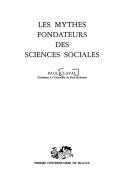| Listing 1 - 10 of 75 | << page >> |
Sort by
|
Book
ISBN: 2213621063 9782213621067 Year: 2004 Volume: *3 Publisher: Paris Fayard
Abstract | Keywords | Export | Availability | Bookmark
 Loading...
Loading...Choose an application
- Reference Manager
- EndNote
- RefWorks (Direct export to RefWorks)
Social sciences --- Sciences sociales --- History --- Congresses --- Histoire --- Congrès --- Bourdieu, Pierre, --- Congrès --- Social sciences - History

ISBN: 0582055466 9780582055469 Year: 1993 Publisher: London Longman
Abstract | Keywords | Export | Availability | Bookmark
 Loading...
Loading...Choose an application
- Reference Manager
- EndNote
- RefWorks (Direct export to RefWorks)
Political science --- Social sciences --- History. --- #GROL:SEMI-32<09> --- #A9302A --- Political science - History. --- Social sciences - History.
Book
ISBN: 3110651394 3486587269 9783486587265 Year: 2008 Publisher: De Gruyter
Abstract | Keywords | Export | Availability | Bookmark
 Loading...
Loading...Choose an application
- Reference Manager
- EndNote
- RefWorks (Direct export to RefWorks)
To celebrate the 270th anniversary of the De Gruyter publishing house, the company is providing permanent open access to 270 selected treasures from the De Gruyter Book Archive. Titles will be made available to anyone, anywhere at any time that might be interested. The DGBA project seeks to digitize the entire backlist of titles published since 1749 to ensure that future generations have digital access to the high-quality primary sources that De Gruyter has published over the centuries.
Aristocracy (Political science)
---
Aristocracy
---
Political science
---
Bielefeld <2006>
---
Griechenland

ISBN: 2130363393 9782130363392 Year: 1980 Publisher: Paris PUF
Abstract | Keywords | Export | Availability | Bookmark
 Loading...
Loading...Choose an application
- Reference Manager
- EndNote
- RefWorks (Direct export to RefWorks)
Social sciences --- Sciences sociales --- History --- Histoire --- -Behavioral sciences --- Human sciences --- Sciences, Social --- Social science --- Social studies --- Civilization --- History. --- -History --- Social sciences - History
Book

ISBN: 2912601363 9782912601360 Year: 2006 Publisher: Auxerre Sciences humaines
Abstract | Keywords | Export | Availability | Bookmark
 Loading...
Loading...Choose an application
- Reference Manager
- EndNote
- RefWorks (Direct export to RefWorks)
Qui sont ces hommes, pionniers, inventeurs, découvreurs des sciences humaines ? Ce sont des hommes et des femmes, justement, avec leurs prémonitions et leurs visions, mais aussi leurs limites, leurs contradictions... L'histoire des sciences humaines est une somme d'histoires de vie, d'intuitions brillantes et d'erreurs de jugement. Il y eut d'abord les pionniers. Ils portent les noms de Boucher de Perthes, Alexandre de Humboldt, Jules Michelet, Lewis Morgan, Alexis de Toqueville, Auguste Comte et bien d'autres, qui, à leur manière ont participé à la construction d'un savoir nouveau. Puis vint le temps des fondations - avec Emile Durkheim, Sigmund Freud, Franz Boas - où les disciplines se cristallisent alors autour de revues, d'écoles de pensée, d'institutions. Enfin, arrive le temps des chercheurs, dans la seconde partie du XXe siècle. Les sciences humaines connaissent alors croissance, spécialisation et professionnalisation. Dans un style narratif accessible, Jean-François Dortier et l'équipe de Sciences Humaines accompagnent le lecteur dans les méandres de la construction du savoir. Ils jettent un regard original et érudit, parfois amusant sur un sujet méconnu : deux siècles de sciences de l'homme et de la société.

ISBN: 0710000898 Year: 1979 Publisher: London Routledge and Kegan Paul
Abstract | Keywords | Export | Availability | Bookmark
 Loading...
Loading...Choose an application
- Reference Manager
- EndNote
- RefWorks (Direct export to RefWorks)
S11/0400 --- Sociology --- -#SML: Joseph Spae --- Social theory --- Social sciences --- China: Social sciences--History, surveys, general: China --- History --- History. --- #SML: Joseph Spae
Book
ISBN: 0873322789 9780873322782 Year: 1984 Publisher: Armonk Sharpe
Abstract | Keywords | Export | Availability | Bookmark
 Loading...
Loading...Choose an application
- Reference Manager
- EndNote
- RefWorks (Direct export to RefWorks)

ISBN: 0792310012 9780792310013 9780585291741 9786610956388 1280956380 0585291748 Year: 1991 Volume: 15 Publisher: Dordrecht Kluwer
Abstract | Keywords | Export | Availability | Bookmark
 Loading...
Loading...Choose an application
- Reference Manager
- EndNote
- RefWorks (Direct export to RefWorks)
This book, which represents probably the most comprehensive discussion of the emergence of modem social science yet produced, is of far more than merely historical interest. The contributors set out to rewrite the history of the social sciences and to show the limitations of conventional conceptions of their development. These tasks they accomplish with great success and much distinction. Yet in so doing they contribute in a direct way to our understanding of the relation between social analysis and the nature of human societies today. The brilliant and distinctive perspective of the papers in this collection is to demonstrate, with many specific examples, that social science and modem institutions have helped shape each other in mutual interplay. Modem systems are in some part con stituted through the reflexive incorporation of developing social science knowledge; on the other hand, the social sciences organise themselves in terms of a continuing reflection upon the evolution of those systems. Such a perspective, as Wagner and Wittrock in particular make clear, does not in any way either impugn the status of knowledge claims made within social science or destroy the independent reality of social institutions. The book questions the notion that the institutionalising of the social sciences can be understood as a process of their increasing autonomy from extemal social connections. 'Autonomy' forms a mode of legitima tion and a basis of power rather than a distinctive phenomenon as such.
Social sciences. --- Social sciences --- Sciences sociales --- Philosophy. --- Philosophie --- Philosophy --- History --- Social sciences -- History. --- Social sciences -- Philosophy. --- Social Sciences --- Social Sciences - General --- -Social sciences --- -Behavioral sciences --- Human sciences --- Sciences, Social --- Social science --- Social studies --- Civilization --- -History --- Social philosophy --- Social theory --- Social aspects --- Addresses, essays, lectures --- Political science. --- Economics. --- Sociology, general. --- Political Science. --- Economics, general. --- Sociology. --- Management science. --- History. --- Social sciences - Philosophy --- Social sciences - History

ISBN: 0582055407 0582055466 0582055415 9780582055414 9780582055407 Year: 1992 Publisher: London Longman
Abstract | Keywords | Export | Availability | Bookmark
 Loading...
Loading...Choose an application
- Reference Manager
- EndNote
- RefWorks (Direct export to RefWorks)
Social sciences --- Political science --- History --- Science politique --- Sciences sociales --- Histoire --- History. --- #GROL:SEMI-32<09> --- #A9301A --- -Social sciences --- -Behavioral sciences --- Human sciences --- Sciences, Social --- Social science --- Social studies --- Civilization --- Administration --- Civil government --- Commonwealth, The --- Government --- Political theory --- Political thought --- Politics --- Science, Political --- State, The --- -History --- Political science - History. --- Social sciences - History. --- Social sciences - History --- Political science - History
Book
ISBN: 9004309985 9789004309982 9789004309722 9004309721 Year: 2016 Publisher: Leiden Boston
Abstract | Keywords | Export | Availability | Bookmark
 Loading...
Loading...Choose an application
- Reference Manager
- EndNote
- RefWorks (Direct export to RefWorks)
Within a movement towards the circulation and globalisation of knowledge, new centres and new peripheries form and new hierarchies appear - more or less discretely - producing competition and rivalry in the development of “new” knowledge. Centres of gravity in social sciences have been displaced towards Asia, especially China. We have entered a period of de-westernization of knowledge and co-production of transnational knowledge. This is a scientific revolution in the social sciences which imposes detours, displacements, reversals. It means a turning point in the history of social sciences. From the Chinese experience in sociology the author is opening a Post-Western Space where after Post-Colonial Studies, she is speaking about the emergence of a Post-Western Sociology .
Sociology --- Social theory --- Social sciences --- China --- Europe --- Social conditions. --- S11/0300 --- S11/0400 --- S11/0200 --- S11/0497 --- China: Social sciences--History, surveys, general: outside China (Asia, Africa, Latin America) --- China: Social sciences--History, surveys, general: China --- China: Social sciences--General works --- China: Social sciences--Society since 1976
| Listing 1 - 10 of 75 | << page >> |
Sort by
|

 Search
Search Feedback
Feedback About UniCat
About UniCat  Help
Help News
News